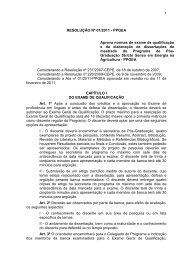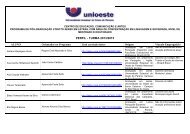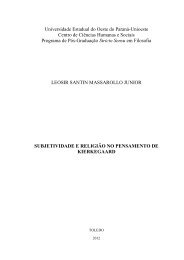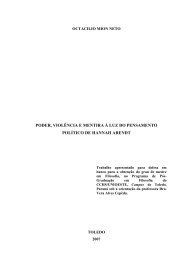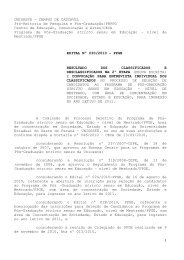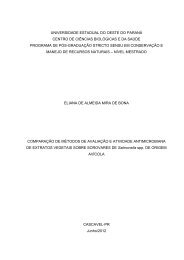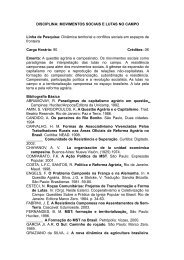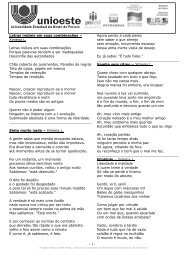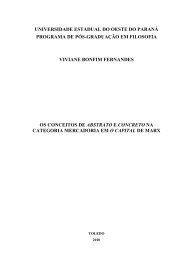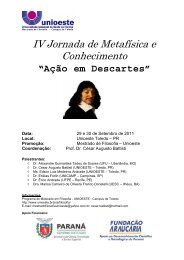jaqueline fátima roman fundamentos de legitimidade do ... - Unioeste
jaqueline fátima roman fundamentos de legitimidade do ... - Unioeste
jaqueline fátima roman fundamentos de legitimidade do ... - Unioeste
Create successful ePaper yourself
Turn your PDF publications into a flip-book with our unique Google optimized e-Paper software.
ROMAN, Jaqueline Fátima. The Legitimacy foundation in Rousseau´s Political Law. 2011.<br />
120 f. Dissertation (Master’s Degree in Philosophy) – Universida<strong>de</strong> Estadual <strong>do</strong> Oeste <strong>do</strong><br />
Paraná, Tole<strong>do</strong>, 2011.<br />
ABSTRACT<br />
This work aims to investigate what are the legitimacy foundations of political law in the<br />
thoughts of Jean Jacques Rousseau. For the Geneva-born philosopher, the man is not a<br />
political being by nature, as politics is directly related to social life. Only in the social state it<br />
is possible to talk about such law. However, the present work starts with the study of the state<br />
of nature, and eventually it will approach the social state. This is justified by the fact that it is<br />
in this state that Rousseau, through the hypothetical natural man, builds the i<strong>de</strong>a of what he<br />
consi<strong>de</strong>rs to be a reference of human being. Leaning on the natural man, he finds arguments<br />
to differ artificial and natural features of man. The study of the state of nature is also<br />
important because in it there are feelings that will be necessary to form a society foun<strong>de</strong>d on<br />
the legitimate political law, as it is the case of love of oneself. This might be the starting point<br />
to un<strong>de</strong>rstand the legitimacy foundation in Rousseau’s political law. Starting from the study<br />
of the differences between the state of nature and the social state, it is possible to show why<br />
the pact between rich and poor, foun<strong>de</strong>d on the inequality, is consi<strong>de</strong>red illegitimate by<br />
Rousseau, and also reason about the necessary political foundations for the building of a<br />
legitimate civil pact. What are the necessary conditions for the man to live in society as free<br />
as before? In Rousseau’s point of view, the man cannot renounce his free<strong>do</strong>m; otherwise he<br />
will lose his human condition, as each man has the same value as the others from his species,<br />
and therefore cannot <strong>do</strong>minate or obey others. Thus, a civil pact similar to the pact between<br />
rich and poor is completely illegitimate to Rousseau because it allows the <strong>do</strong>mination of a<br />
man over another, <strong>de</strong>naturalizing him. The free man is the one that obeys only his own will.<br />
But how can we envisage life in society with the obedience of solely one’s own will, that is,<br />
from what reference is it possible to found a legitimate pact and, consequently, Political Law?<br />
To solve this problem, our philosopher proposes a new civil pact, and in it the i<strong>de</strong>a of popular<br />
sovereignty: people reunited in assembly are the only legitimate sovereign and apt to approve<br />
laws which they have to obey. These laws must be in accordance with the general will, which<br />
aims at the common well-being and the public utility. That way, each man votes according to<br />
his conscience, without any influences, and obeys only his own will, which is consequently<br />
reflected in the laws he has approved. Therefore, a man cannot relegate to a representative the<br />
power to approve laws, because the exercise of sovereignty is inalienable. This is the<br />
legitimate way that Rousseau found for the man to obey but not to serve.<br />
KEY WORDS: Rousseau, Political Law, Civil Pact, General Will, Legitimacy.






